#humanised nations
Explore tagged Tumblr posts
Text
A stay fit for an Emperor - Part 1
« Voilà la vraie demeure des rois, la maison des siècles » Napoleon ---------------------------------------------------
The carriages movement could be a soothing one, if rocked ever so slightly and given one isn't motion sick easily, sleep could be reached easily. If one wasn't tense, or struggled with sleep. Marie suspected it was the latter over the former, sleep could qualify in every way as an old enemy, though it's one she neglects in face of older enemies, or more proactive ones. Nonetheless, a certain strain inhabited her composure when she graciously took the valet hand and helped herself out.
The silence between her and the monarch was not innocent. His majesty, François 1er would take one peek at her to which she, very graciously thank you very much, feigned a lightness. "It must be the humes. Or maybe I've taken one bath too much." Marie said in a small voice, it could be just as well her lack of proper eating. She added a trembling smile and asked to be escorted to her chambers.
There was no certainty she'll be back in time for dinner, one wouldn't underestimate such a stubborn nature after all. Yet she did, as silently as she made way to her seat, as casually she started conversation with the nobles in her vicinity. It's only later, much later in the evening that she made her way towards the library, a sight which had gone through a certain derarification in those times, it was mostly studies that drove her in that place and she still preferred oral communication, but she did not circle around the place and understood the place of written words.
It wasn't a book she was looking for though, she looked for one, she spotted just the place she wanted and stared at the blurry pages and lines for a few good long minutes. Finally, she spoke up flatly., without crossing gazes. "His majesty wasn't serious about his proposition to house our Habsburg neighbours, was he?"
"We do not believe to have been making any pleasantly, so yes."
"Ah." France flipped a page, her hand went to trace the rough surface of the table. She sucked in a breath and noted with a frown, that she could still feel scars underneath the tissue. Italy had not been a kind campaign to her beauty, her eyes were tired and scar laid hidden from any peeking eyes as possible. "His majesty knows we admire his generosity, amongst Christians virtues. And surely, hospitality is one of them. But he can also understand; Habsburg is…" She made a pause, making a gesture of searching for the right word to describe her counterpart. "Habsburg."
"We would know that, would it pause any particular issues?" The King's answer came curtly but she did not let go, starting bolder than the last. "Mostly some concerns. We have a lot of Habsburg around already. There's at the north, the south too is Habsburg, our east would know and well, not our close west but take some distance further the ocean and, would you look at that, here is some more Habsburg." Marie talked and stopped herself from grinding teeth, it was humiliating really, that ring like a chain around her neck, threatening to get ever tighter when she moved.
"Speak more clearly, what would those concerns be then?" There was something daring in the way those words articulated, any wiser men by now would have retracted their words and buried themselves in excuses. Marie was no man, and so she took for herself the right to scoff and slam close the book."That if I get served more Habsburg, I might get a Habsburgian overdose and commit a very Habsburg inspired act." She nearly spat out, glaring at a spot on the wall. "So you don't want me to invite them." His eyes were on her, she could just tell and felt the need to roll her eyes. "As of current no, but understand certain circumstances, which would be at large, in proper and concise terms, taking a liking for ruining my Christmas, I may reconsider."
"Don’t be unreasonable by seeing this as an insult to you." Marie's golden pupils met his and her spiel seemed to moderate himself. "It makes for a strange present, Christmas and birthday counted. We would like to remind his Majesty that the Anglois already were a great effort of charity on our part." Her nose curled, and they had naught, or near, to show for it, in fact as of now, it seemed to make each of them even more determined in being an annoyance. Some that are qualified as wise would say it was foolish to expect anything from that treacherous bunch to start with, Marie wouldn't be inclined to contest now.
"We aren't misusing our words here, who is talking about charity at any point? Didn't you, as it is still fresh in memory, have quite some fun at Calais?" Fun? She but the inside of her cheek but failed to conceal a small smile when that ravishing time came to mind, it was relaxing in many ways and she, admittedly, did not regret the events that transpired then.
"I did enjoy partaking in the fine sports of noble men, but it does not bode well in this discussion." But back to reality, to their present away from a perfect red. The King on his part moved from his seat, placing the book on the way. Some would claim fortune, its place was right next to her chair, Marie believed less and less in fortune these days. "It shows that you can get the best out of a situation, even those you treat as infamously unbearable."
"Let's imagine ourselves there, the Holy Roman Emperor, King of Spain, Duke of Burgundy" A sneer that was meant as a smile formed on her face. " King of Naples and Sicily, Duke of Milan," She didn't miss the way his lips twitched and she doubted it was a pleased expression. "and Archduke of Austria will be there. And his representative for the occasion too, and as for us?" If her attention started to wander through that listing of exhaustive titles, it was grabbed by the mention of her slightly more than acquaintance, not to say rival. Marie stilled and her heart beat soundly in her chest, the night felt warmer suddenly and she would say through the worst of pain, it's the hellish poison of hatred that caused these burns.
"We will welcome them in a resplendent Palace, feed them well, entertain them, they will stay for festivities and what kind of impressions will they keep after they leave on their way to the Spanish part of the realm?" He didn't need to say more, she saw it with unspeakable clarity. Not only a good reputation wouldn't hurt, not only they might get in their favour though it was a lot less likely…
"...This will put them both in great disposition." Marie's good mood manifested itself through a more than appeased, excited gleam in her eyes. Oh she could more than see it now, she could near taste it, there were few things as humiliating in their business, than for your rivals to seem better off than you are. To picture Autriche's face now, to see her so well dressed, to be welcomed, and warmed though it won't budge the ice cube Marie daringly called a heart, but the thought, just the thought, imagining red going to her cheek, taking over that pale skin, clouds of trouble in those blue eyes – Her heart swelled with what she decided to call pre emotive pride, her head had started to spin a little still.
"And our efforts might be well rewarded." Marie would have frantically nodded. A duchy of Milan, the accomplishments of a literally, a jealous Autriche? She cleared her throat. "Pray tell, when should I have a letter sent Fontainebleau about this great moment, incredible occasion? It is not any day, the.one where two great Christian rulers will share the same roof, especially when the age of the crusades has passed." It seemed impossible to keep still now, she needed to move, so much, so much to be done.
"As soon as possible." King François, with a royal firmness, gave her the authorisation to go as if she were a child waiting to play
So much to do indeed, afterall how could one ever be quite ready to have a memorable stay for an Emperor?
4 notes
·
View notes
Text
it shouldn't be revolutionary and refreshing that atla portrayed the fire nation as being just people living their lives and it's the decisions of a small minority at the top of the government that are fucking things up for everyone, but i genuinely love how well they humanised the fire nation as a whole
569 notes
·
View notes
Text
The "funniest" genre of sinophobia on this website would have to be the purely vibes-based variety. Like there will be a perfectly normal, innocuous picture of something in China and so of course some idiots decides to leave some harassment. But instead of making any actual claims (regardless of how ridiculous or unsubstantiated) like "Don't you know they genocide a gajillion weezers and have 50 tiny man squares a week", they just go like "I dunno man. Something's kinda off about this picture don't you think? Can't put my finger on it but it just doesn't feel right".
And like this sort of thing does ultimately (in a small way) serve to further Imperialists interests; placing a chilling effect on any attempt to humanise the people of China. The less you see China as a real place inhabited by real people, the easier it is to swallow whatever comical lies that the agents of Imperialism make up in order to discredit it. The aformentioned vibes-based Sinophobic comments are a somewhat subtle form of harassment, rude and disrespectful but with just enough deniability to play off any responses it receives. "I'm not racist. It's just something I noticed. I'm just asking questions". If you make any mundane discussion of China into a hostile environment, then hopefully people won't casually talk about it so much and any conversation about a nation of 1.4 Billion people can be dominated by Imperialist propagandists.
Of course, the people actually leaving these comments normally don't think about it this way. They aren't intentional agents of Empire, they've just internalised enough propaganda to act that way regardless. After all, stupidity is one of Malice's favourite tools
81 notes
·
View notes
Text
Everybody should have their own fun, and this isn't trying to harsh anybody's buzz, but I find the impulse to make your own cutesy/badass Replika oc doing funny or heroic or badass things a little odd. Like, that character you designed as a super badass soldier, or well-armed and armored steely eyed cop type... who would they have been built to fight or police exactly? Remember who all those guns and weapons were intended for use on?
I know we're all sick of discourse over who "gets" the game, and I'm by no means scolding anybody for something that harmless, but what's interesting to me is the sense that designing overtly "cool" Replika personas and OCs, complete with the propaganda poster style imagery, feels a little...
I mean, bluntly, it's like the in-world propaganda worked, unironically, on some level, for many people. Kolibris aren't scary, they're whimsical and fun! Storches aren't notably cruel enforcers and chain gang drivers, they're Protektors! Falke isn't a camp commandant, she's a beautiful angel!
The Replikas aren't cool and heroic figures in the reality of the game. They're the carefully crafted organs of a system of control so dreadful it could do what it did to Elster and Ariane. They're victims to that system themselves too, sure - and humanising them is a nuanced and valuable observation of how totalitarian regimes maintain themselves - but that doesn't negate the fact they're also the ones who operate, enforce and perpetuate it, a big part of what the game knows and communicates about such societies. It's notable that the game makes it clear few, if any, of the Replikas actually buy into the Nation as an ideal at all - they enforce it no less pitilessly anyway, incapable or unsafe to imagine anything else.
Their affectations, pasttimes, trinkets, and even affections for each other, all serve to draw a stark contrast to how callously they regard the gestalts they keep suppressed. Their disposability is something they're conscious and fearful of themselves, but fail to recognise as a commonality with the people they brutalise every day, their business as usual. The only grief, tragedy or suffering they acknowledge is their own - they have no regard for any such things in the humans they have... well, dehumanised.
But S-23 Sierpinski was such a hellhole for most of its denizens under "normal" conditions that the nightmare it becomes is arguably an improvement; if only because there are fewer people left now to suffer it. There's a dark poetry here - because the place's banal cruelty is "off camera" to us, it's very naturally less real to us than the grief of the crying Eule. It's only natural, too, to forget how grim the Replikas' purposes are when you don't have to see anyone endure the brunt of it.
And isn't that the very same effect a state like the Nation is seeking in the first place, by disappearing people away to such dark little corners to have it done? In our world, no less than that one.
That works like a kind of propaganda too, not being able to see it - a propaganda of hidden things, as powerful as any poster. A space that's been intentionally left blank.
Kolibris are literal thought police; they intrude on people's very minds, interrogating them to death as a matter of course, with hardly a care either way. The various Protektor classes are functionally concentration camp guards and slave drivers. Falke and Adler are overseeing what amounts to a gulag, one so unimaginably awful Ariane preferred to spend years of her life alone in space to the prospect of being sent there, and inevitably worked to death, far underground.
I think there's a reason we never see one of those posters for LSTRs in game. How could we be asked to forgive our own if we ever did?
185 notes
·
View notes
Text
There is something inherently important about Caitlyn and Vi's respective natures and personalities that make them Piltover's Finest. Caitlyn was released Jan 2011, and Vi in December 2012, so Riot had plenty of time to make Vi a proper narrative foil to one of the original Champions. And yet it seems like the most important aspects of their characterisation are forgotten, glossed over, or outright ignored in how Caitlyn and Vi are depicted.
Caitlyn is Intention, Vi is Impulse.
The sniper rifle is a tool to handle problems from a long distance away; magnifying lenses on a hat help bring small details in to focus. Caitlyn focuses on a goal, and then looks at every step in the long and short term to achieve that goal. She has single-minded purpose but is able to cover a lot of ground, to have unique perspectives on and multiple opportunities for her desired end result because she has a view of the big picture. She sees how everything is connected, no matter how arbitrary. Every move she makes - socially, politically, nationally, and even on the Fields of Justice - is both deliberate and carefully-deliberated. She leaves nothing to chance. Everything is calculated. Her intention is what matters most; her intent is what makes her powerful, dangerous, unstoppable.
"The whole is greater than the sum of its parts."
"Me, miss? Not by a long shot."
"I have the tools for the job."
"Nowhere to hide."
"Go ahead. Run. I'll give you a five minute head start."
Fists are up close, personal; the gauntlets are hand-crafted, engineered by Vi's own hands to suit her own hands. Vi is reactionary, surrounding herself by the world, immersing herself in sound and sensation and situation and choosing to act in accordance with what feels the most urgent. Vi acts on whatever is closest to her reach or nearest to her immediate needs; she prefers short-term solutions because those are, in her mind, the most necessary solutions. Immediate needs should be met immediately. She doesn't look for the easiest solution, but she looks for the simplest one, the most expedient one. She is adaptive, and quick-witted, and capable of handing upsets and change step by step, without flinching. Vi's impulses guide her every step, trusting chance and circumstance and personal talent to back her up and make her next step possible. Her adaptability and her willingness to be personally-involved is the reason that her 'one foot in front of the other' style of action is so powerful.
"Sometimes you gotta make a door."
"One girl wrecking crew!"
"Let's get crackin'!"
"I like your smile. Makes a nice target."
"Plan? I don't need a plan."
Personified by their weapons of choice, these women are both forces of change in their respective cities. They are both incredibly effective on their own. Caitlyn had her plan and her rules and her methods that involved no-one but herself, and Vi was quick to repeatedly declare 'I'm my own backup'. They do not need each other in order to get things done, to have a wide positive impact on their community or for the people they care about.
And yet, they can do more together than they would apart.
Caitlyn can be distant from those she loves and those she is trying to save, can come across as cold and detached. She does not show her emotions well, if at all; she has more in common with the hextech rifle she carries than with other people. Caitlyn was capable of changing Piltover and becoming Sheriff all on her own, but she was not liked or respected by the people she was trying to save until she had a more-humanising force by her side. A short-sighted answer might be that Vi was so violent and dangerous it made the calmer Caitlyn more appealing by comparison, but that isn't the case at all.
Vi's past is lost to shadow, stolen by those in power who sculpted in misery, so to fight this aching void she surrounds herself with people who need help. She's used to being the underdog, to having the deck stacked against her, but she has built herself to be the strength of others, to fight on their behalf. She looks for joy and resistance in equal measure. Vi is smart, and intuitive, and has a very strong moral compass, even if - especially if - it causes her to clash with the powers that be, those in charge who don't do things they right way or for the right reason.
Both of them are raging against the world in their way. Both of them see potential in the world, for it and for everyone in it, to be better.
It is Caitlyn's intention and methodology that gives Vi the opportunity to do something bigger than the most-immediate threat in Zaun. It is Vi's impulse to send Piltover's trash back across the bay that connects her to Caitlyn, that gives Caitlyn the idea and means to encourage others and affect greater change. Like iron sharpening iron, the two of them improved each other as they began to interact. Of course they clashed when they first met, when Vi found Caitlyn too rigid and Caitlyn found Vi too reckless, but it was in these clashes that they learned to work together, to see from new perspectives. A sniper can't watch her own back. A boxer can't see beyond the ring. But together, they're more powerful than they would be apart. They've got each others' backs, they mitigate each others' weaknesses and boost each others' strengths, and they learn from each other.
Caitlyn is one of the few who can see, acknowledge, and respect the intelligence Vi is trying to hide, both in terms of Vi being an incredibly-talented engineer but also in Vi's social adeptness and comprehension of human motivations. It's Vi who can see Caitlyn's self-imposed isolation for what it is, and call her out on times when a more personal touch is necessary. Caitlyn has learned to be 'more human', to see the impact beyond just statistics and social change, to learn to accept other people into her life. Vi has had the chance to see that structure and morals can co-exist, that not every rule needs to be broken, that sometimes stillness and quietness can be productive.
Caitlyn and Vi are still their own people. Caitlyn will always lead with her intention, and Vi will always follow her impulse, but they'll do it together, mindful of each others' thoughts and methodologies. They've had years to turn their partnership into a kind of dance. It's not perfect, but they know each other so well, to the point of anticipation in movement and thought and action. Caitlyn - in purple, with her sniper rifle - and Vi - in pink, with her gauntlets - are the perfect team, and together they've brought Piltover into a (near-literal) Golden Age as well as been there to lead the city-state through disaster and reconstruction. They've even started making headway into helping those in Zaun, or at least inspiring others to step up and see them as a challenge to be equalled. They are Piltover's Finest, because they match and rival and equal each other, as foils, as partners, as symbols.
And that's something that Arcane absolutely failed to understand.
#caitlyn#vi#piltover's finest#character building#worldbuilding#character development#riot no#riot why#arcane#I've missed writing essays#I've missed my girl#Not Arcane#I cannot stress enough this is not arcane#Arcane fucked up every character but especially Caitlyn and Vi
31 notes
·
View notes
Text
The Awakening
Season 3 let's goooooooooo
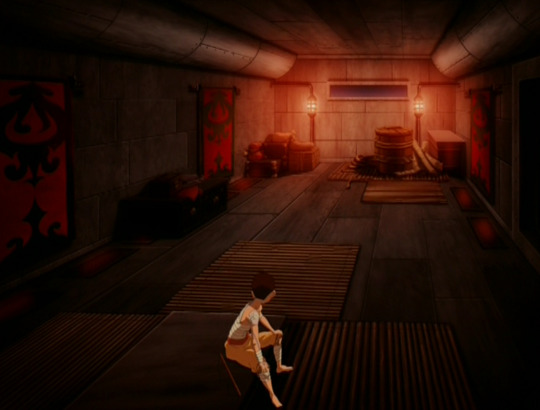
These Fire Nation cells are absurdly spacious.
I do love that Momo's first reaction is kisses.
Not a cell. Oops.
Well that was confusing. I was arguing so vociferously that the SWT weren't pirates and then they go and gank a ship.
Mai girl get it! Questionable taste in men, but I love to see a lady getting exactly what she wants.
Mai: "how are you?" Zuko: *existential dread* Mai: "babe. Shut up."
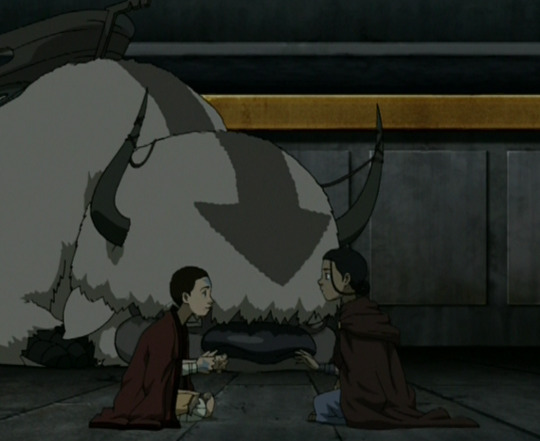
Aang says he's the only one who's completely out of it, but Appa's behind him in full faceplant mode.
Actually, by the hair growth standard established by Zuko, Aang's been out 5 days at most.
Season 1 bitchy Katara is back again. I hate season 1 bitchy Katara.
I'm impressed by how much of these characters' identities is tied to their colour palettes. I see all these water tribe guys walking around in reds and blacks and I have no idea who I'm looking at.
Aang's eyes are back to brown this episode.
I love that Katara has no idea how she healed Aang. Superpowered does not mean superlearned. So much more believable than supergenius tweens.
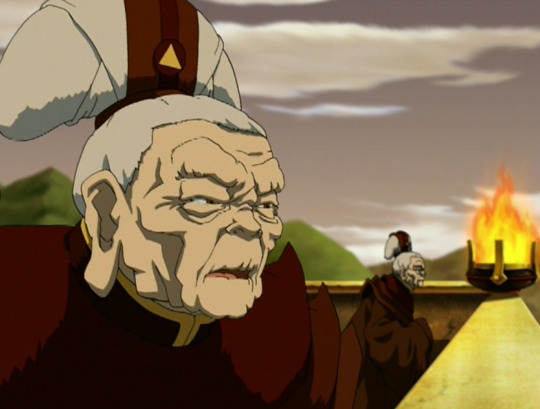
It's the old ladies! They're wearing croissants on their heads. Why not.
This is a cool way to do exposition. A royal proclamation narrating a flashback.
These Dai Li don't know shit about loyalty huh.
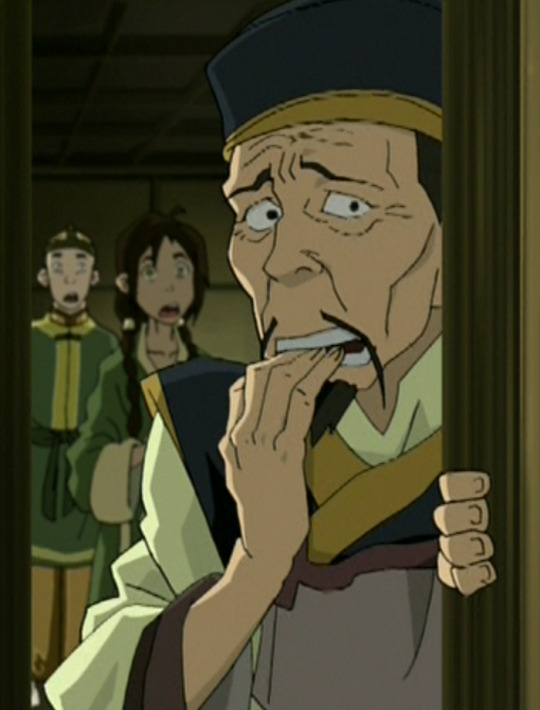
SONG! HI SONG! I MISS YOU!
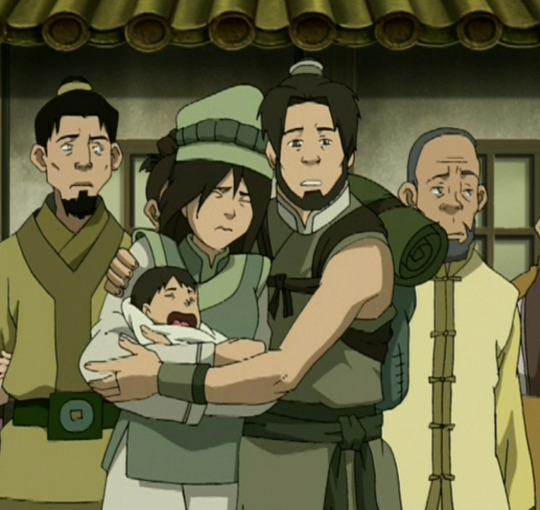
CORNY BABY & FAMILY! HI CORNY BABY & FAMILY! I DON'T MISS YOU! My guy why haven't you unpacked yet.
Given the welcome Zuko gets from the Fire Nation crowds, I'm thinking the exact cause/terms of his banishment were never made public? They're hyping him up like a wrestling entrance. That doesn't track with someone known to be honourless.

I want whatever's in Bato's bowl. Those noodles have him mesmerised. He's staring at them like they're telling him the secrets of the universe.
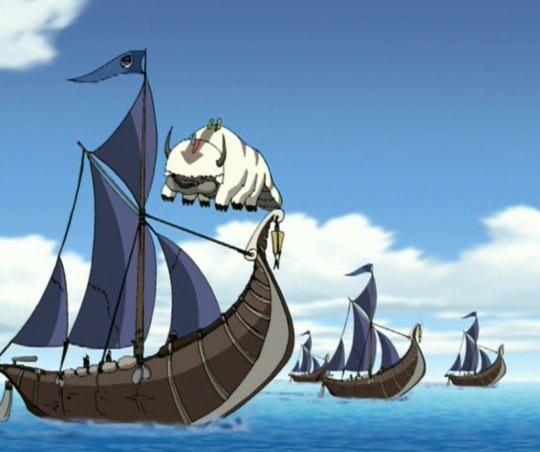
Are you telling me that Appa successfully landed on the deck of one of these ships without sinking it?
I love how Gaang's reaction to everything going wrong is to go find their dad.
STOP GOING ON ABOUT THE INVASION PLAN. IT WON'T WORK. STOP.
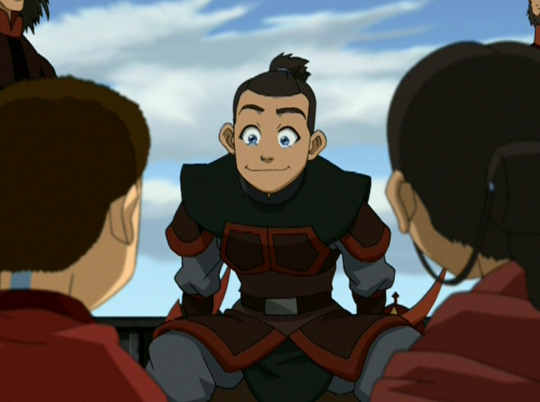
"Yep! The whole world thinks you're dead. Isn't that great!" Sokka. TACT.
Sometimes Sokka's brain gets too far ahead of itself.
Poor Aang. Not many people whose deaths are wrongly cause for celebration live long enough to see those celebrations.
How do the topknots fit inside the helmets?
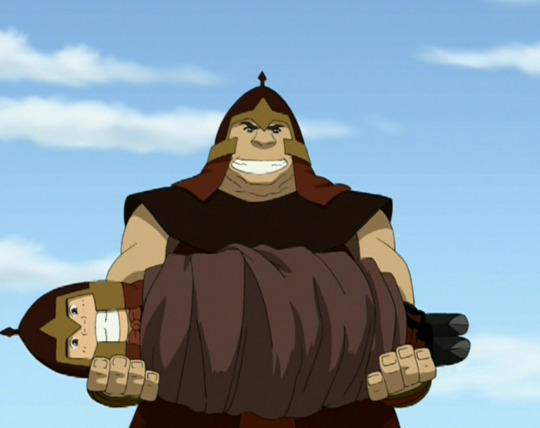
This is silly beyond words. It's a two second throwaway gag but they're so into it.
Aang saying "I hate not being able to do anything" to the girl whose whole existence was not doing anything until recently is certainly a choice. And honestly, wasn't Season 1 Aang's whole point not wanting to be the Avatar? Actual responsible adults are handling the problems for once. He should be ecstatic.
I just realised this Fire Nation disguise ship plan means there are people in the Southern Water Tribe who know how to run coal powered ships. Neat.
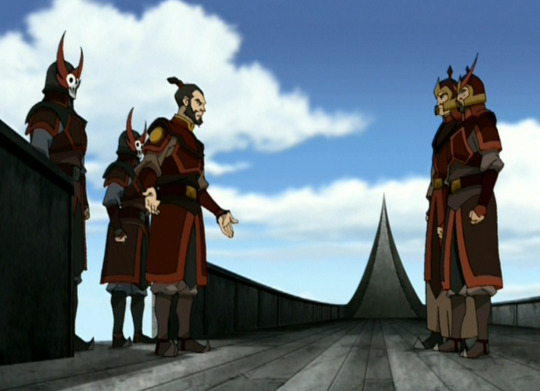
One of the things I really love about Avatar is how much love they put into the side characters. This guy on the left is a nameless mook, but in the three to four lines of dialogue he gets, we see a world of political and bureaucratic headaches and a bunch of normal, humanising emotions (who hasn't been angry at that one coworker who can never be bothered to email?). The writers didn't have to give him that much personality, but they did!
Also, how often do Fire Nation ships get captured, if two pieces of bureaucracy not lining up causes this guy to jump to that conclusion, rather than think the bureaucracy messed up?
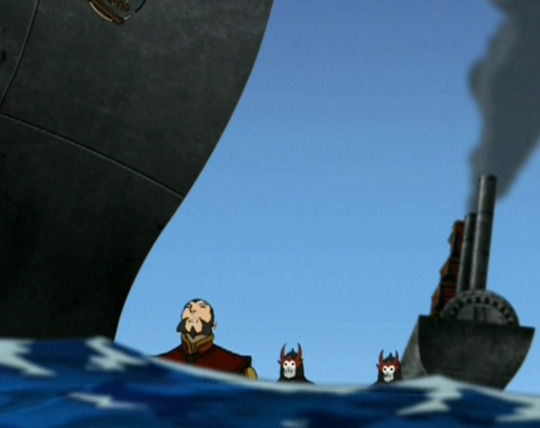
Someone in the Fire Nation has invented extra buoyant metal.
Turtleducks are scared of Azula. Turtleducks are good judges of character.
An awful lot of this episode is flashback footage.
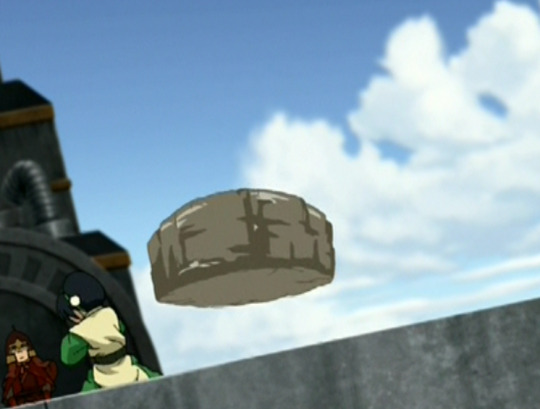
Toph is a missile launcher. This is all I wanted out of life.
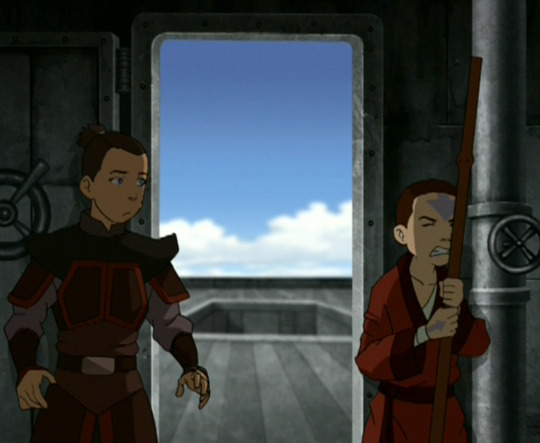
For the first time ever, Aang gets to play the role that Sokka plays in every bending heavy battle.
Since when can Katara do bending moves this big?
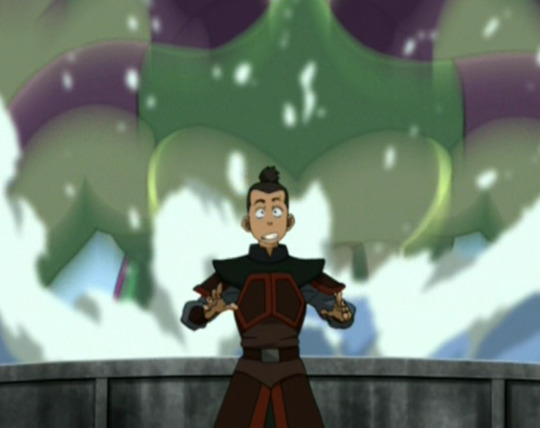
Sokka once again harnessing his ability to speak the opposite of what he wants into existence.
They said they passed through the serpent's pass a few days ago. Clever foreshadowing I completely missed.

Don't you love it when all your problems cancel each other out?
Aang. This is not the hill to die on. Also please don't throw tapestries around in a room with unguarded candles until you can firebend.
Wow Aang is just taking all the wrong lessons from this. And he's stealing Zuko's lines.
Turns out the Firelord is just some guy with an unfortunate goat beard.
Katara finally gets a chance to be her age, complete with nonsensical emotions and misdirected anger. I hate bitchy Katara but I love seeing her expressing the root of that bitchiness. And I love how illogical it all is, and that she acknowledges that! Emotions ARE illogical and messy!
Contrasting Hakoda winning Dad of the Year with Ozai setting off every alarm bell known to man is a choice. A really good choice. But wow. Not subtle.
I knew Azula always lied, but to her own dad/Firelord too? That's a dangerous move.
Aang. What are you doing. Stop.
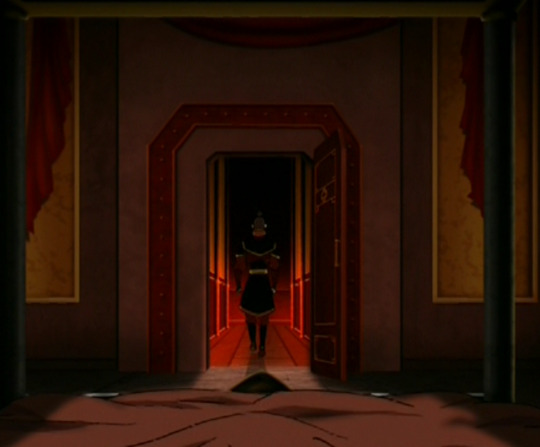
Leave the door open. Peak sibling move.
In a turn of events that should surprise absolutely no one, Zuko's been played like a fiddle by his sister and is now as trapped as ever. The surprising part is that Azula thinks she can get away with lying to the Firelord too. Don't know how that's going to go for her long term.
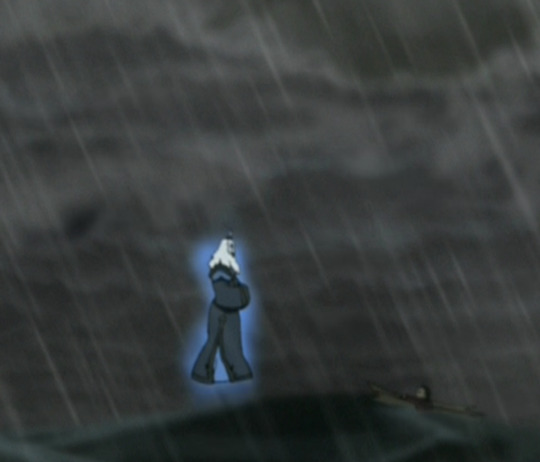

So much for me saying the Avatar universe doesn't do ghosts. This season opener is surprisingly backwards-looking.
No offense to ghost Yue, but I think the saving the world she's referring to is the time she and a massive fishman saved the world, not strictly Aang.
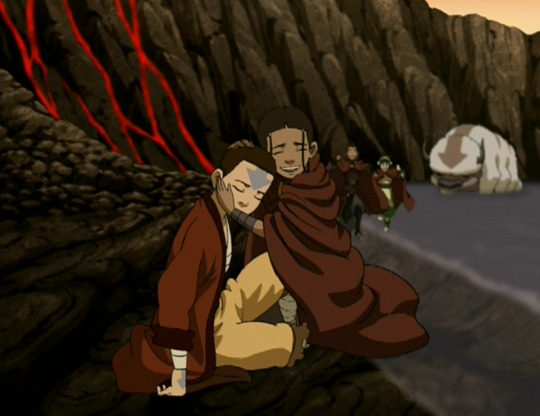
How did they get past the blockade and find the right island?
I cringed at Katara's knee slide.

How are they standing on that island or breathing the air if it's hot enough to do that?
Final Thoughts
...what was that?
Seriously. This episode was a disorganised and aimless mess with the occasional gold mine of characterisation bobbing around. Did the writers not have a plan for what would happen after season 2 ended? This episode feels like the writers had as much plan as the characters did. If I was feeling charitable, I would say that this episode was a hot mess as a metanarrative commentary on Aang and the world's state, but I'm not feeling charitable. I think this episode was just a hot mess.
First, the good bits.
I liked that Sokka was very in character. We've seen before how he can run away with an idea to the point that he forgets to mind the human element. This episode's Sokka felt very much like Sokka. I liked that the beat up Sokka quota was replaced with 'Sokka dares the universe to play chicken and actually wins for once.' His optimistic characterisation this episode didn't grate like his inexplicable optimism did in Ba Sing Se, because here he has a reason to be happy. He's got his dad and a plan. Being around his dad and their people has done him good.
I like Toph the Ballista.
I like the noodle hypnosis.
I loved Katara's emotional blow up. It doesn't matter how noble or important the cause, leaving your kids for a cause is still leaving. I love that she points out how illogical her emotions are being. And I love that Hakoda creates a no-judgement-all-comfort-safe-to-rant zone for her. She's been waiting to do that for a while, and some of it came out at Zuko last episode, so it's been established that she's at boiling point. Fun fact: Katara has now had emotionally fraught venting sessions at Hakoda, Zuko, and Jet if you squint. I don't know what to make of the fact that the show has grouped these men into the same category of 'safe for Katara to vent to.'
I liked a couple of the throwaway gags, and the throwaway characters.
I liked the framing of Zuko's reintroduction to his father. Great use of angles and shadows. We've had two seasons of build up to this guy as the Biggest Bad, and the scene of Zuko kneeling in the throne room while Ozai paces around and delivers the world's most menacing praise felt big enough to be the crowning glory of that payoff. Especially contrasted to the loving father daughter reunion of equals it was interspersed with. But...
The bad bits.
Why did they immediately undermine two seasons of hype and all of the episode's menace by showing the Firelord as a gullible idiot who can't spot a bold-faced lie coming from a tween? I am legitimately pissed off that they defanged him as a threat so soon after introducing him. And I don't think showing that Azula can successfully lie to the Firelord builds up Azula as a threat - I think it also undermines her, because it's a stupid move. This episode could have introduced the biggest bad and reinforced the threat posed by last season's antagonist. Instead, it completely neutered the biggest bad and made Azula look like an idiot. I am actually mad about this.
Other stuff I didn't like: Aang's whole deal. Of course he was going to lose his mind and not be ok about what went down in Ba Sing Se. But he's never this dismissive of his friends, and a huge part of his early character is the fact that he would absolutely love it if some qualified adults stepped in and did the job he was unwillingly born into. Aang this episode felt self-centred and out of character.
Zuko's usually not this dim. I had figured out the angle Azula was going for by the end of the turtle duck pond conversation. Why can't he figure out for himself why Azula has redirected the potential blame if Aang is found to have survived?
The pacing felt off. The A plot flipped between action set pieces and emotional stuff. The B plot was purely talking. But the action set pieces felt out of place in an otherwise quiet episode. I get that you need something to interest the 8 year olds hyped up on sugar who only want explosions, but I think this episode would have been a lot better without the 'Aang almost drowns but gets a pep talk from a couple of ghosts who say exactly what everyone else has already said to him for two seasons but for some reason Aang listens this time and it works.' Why couldn't we have had a quiet episode?
Speaking of, why are Roku and Yue randomly popping up? Last time Aang talked to Roku, it took a trip into the Avatar state and the destruction of a very stupid general's whole army base. The ONLY person who's talked to Yue since she died is Sokka, and that took a magic swamp. I just don't get it. I don't get why they were there, why they said what they did, why those particular words in that particular order worked on Aang when no one else's words were getting through. I don't get why hiding out in the Fire Nation is the plan of choice over chilling with the Southern Water Tribe (other than because the plot says no responsible adults allowed).
The action piece with the Snekky Boy was fun. Even if what set it off was contrived (which it was), I think it was a fun watch and the only action the episode needed.
This episode was also so dark that I spent more time contemplating how much I really need to clean my screen than watching stuff happen.
I got so pissed off at this episode that I totally forgot about Mai. Go Mai! I am WEAK for romance arcs that boil down to 'Girl sees boy. Girl wants boy. Girl gets boy." Go Girl! Like I said above, questionable taste, but if it's what she wants, then congrats on getting it. I love Azula noticed and is like 'my resident goth appears to be broken.'
I have decided that Toph carved an underground harbour like the refugee station on Full Moon Bay and stashed all the water tribe ships in there, because those ships are too pretty to scuttle.
If I could surgically remove that scene between Katara and Hakoda and insert it into some other episode, I'd never watch this one again.
#atla#avatar: the last airbender#avatar the last airbender#The Awakening#unlike my s1 & s2 DVDs this one isn't bilingual#I can only conclude that the Fire Nation hate the French
81 notes
·
View notes
Text
Cry me a river, your attempts to humanise the demigods of Elden Ring makes me laugh.
These guys are powerful and intelligent beings that have their own goals and ideals and very selfishly pursue them and do not care who they trample on to achieve their goal.
Even the kindest, Miquella, despite what he wanted to achieve, a better world for all, would have been built on killing those who did not submit to the order.
The Golden Order is built on a genocide after Marika suffered to deeply at the hands of the Hornsent. Mohg is out there doing what he needs to do for his Dynasty. Radahn let his nation rot (although I don't think that was of the plan lol) so he could have his glorious death and then get to fight in an endless war. Ranni triggers the shattering, killing her half-brother to escape her flesh and control of the Two Fingers. Morgott is holding onto an oppressive order refusing to allow any change to happen. Rykard fed himself to a serpent and continues to eat those loyal to him. And Malenia is sleepy.
We as the Tarnished rold in and we decide which order we align with and proceed to kill everyone else that opposes it. Elden Ring isn't black and white so I don't know why people pretend it's so simple when there's so much to unpack and discuss.
I suppose a lot of people think if you like certain characters it means you become a glowing endorsement of their actions? No one thinks that, if you like the evil blood lord power to you I think you have the right to love Mohg without the need to strip away all the components that make him Mohg.
Anyways who is getting raw dogged by [insert elden ring character name]
#elden ring#miquella#shadow of the erdtree#promised consort radahn#general radahn#marika the eternal#messmer the impaler#malenia#i think you should enjoy whatever character you like#who cares#i love morally grey things#who wins the elden ring twerk off
16 notes
·
View notes
Note
ELABORATE
If you insisttttt <3<3<3<3<3<3
i assume you are asking about the clinical breakdown by the Admiral Lord
Alfred is born in 1631, the settling of the colonies is still uncertain. Having said that, it's def more stable than in the late 1500. It took a long time for his son to be born. Lots of tries and failures. I do hc that Alfred and other countries are BORN. In the human way, to humans, to countries, it does not matter. They are spawned in a very human bloody and painful way. Alfred was born when Boston was established. He does have a mother ( i like to mix the old 2014 hcs that there was a country in that region specifically before the english but having done any kind of research will show that so many different cultures and languages and frankly ways of life existed in the now united states and then "13 colonies" that its straight up and down right unethical to have a single "Native America" representing those vast cultures. Now forgive my balkan-ness for keeping this part short but getting into his part of my hcs is not in my interest or my forte. I just like to humanise these beings, especially Alfred as much as possible) and that mother gave birth to him. Colonisation and settlement in the 1500s and 1600s is cruel, abhorrent and unspeakable to those living on these lands prior to the arrival of the english and for a while dutch. As many nations opposing the empires do, she dies in silence and solitude. Alfred is left in his father's care.
Boston is stable when Alfred first dies. The babe has weak lungs and Arthur doesn't understand. Alfred dies again a year later from the same illness. This time Arthur is aware of an outbreak of illness near the bay. The boy will strengthen and come back to him. He does but only for 2 months before he is ill again. There were difficulties in finding potable water in that part of the colony. Arthur is perplexed, this isn't the sort of thing nations fall ill for and die over. He starts to worry severely, keeping the boy physically close by and under care at all times. Just to make sure the boy, the personification, is in perfect health at all times. Maybe this way, Arthur thinks, his baby will stay with him. It seems that he was right because Alfred lives healthily for more than 2 years. He is fed, he is warm, he is happy. Alfred doesn't wake up one morning. He is still in his crib. He doesn't cry for attention. This time Arthur cries audibly yet carefully, alone in his study. Exiles, brutality and deaths of settlers seem to be the cause. His baby is in London and the order is set for the child not to set a small and wobbly foot in the colonies. His flame is extinguished not even a week later. Arthur is numb at this point. He cannot take it anymore. His guts and throat are in a state of constant clenching. He is vomiting and in pain. England is thriving, Arthur is in a state of misery.
The final straw, final death comes 4 months later with no warning and no apparent causes. Arthur is hosting his brother Rhys in the drawing room. Arthur has had enough. The nurse brings in his boy, Arthur takes his baby into his shaking arms, without a sound. His brother is aware of his nephews struggles with keeping alive. He tries to talk to Arthur, he tries to get him to say anything. Arthur does eventually speak, his voice getting more and more hoarse. Rhys takes his nephew slowly. Arthurs last straw breaks. He is on the floor, he is mourning, sobbing, sorrowing, yelling. Rhys and no one has ever seen Arthur Kirkland like this. He is weeping. Arthur finally broke down.
Part 2 maybe when I pick myself back up from the floor?
#i need to stop im gonna make myself sick#hetalia#hws england#hws america#meli speaks#ask meli#historical hetalia#my headcanons#jesus fuck i need a nap
88 notes
·
View notes
Text
every single spurs fan needs to watch ‘let’s talk’ with ange (part one, part two, part three).
more than a manager, he’s a proper human being who’s gone through a multitude of struggles and come out the other end a deeply empathetic and hardworking man. he speaks in such a vulnerable and open manner about his father, how he’d work all week as an immigrant in australia and would only ever get up from the half hour he had to himself on the couch after work to take him to training, and how ange wanted his attention and validation desperately. how football was their connection, the thing that his father could give him to feel a sense of belonging as a child of immigrants in a time where nobody in australia knew much about other cultures. how he regrets that his father died before he could see his proper success, how he sees him in the mirror every day, how when he takes his mates round hotspur way and the lane it feels like he’s showing his dad round. how everything he does is for his father and how he almost lost that spark when he passed. the fact that his football teams are moulded in the shape of what his father would love to watch in a team.
and then you have him talking about what it was like to be a child of immigrants in australia with the funny surname. how he never felt like he was australian enough despite having an illustrious career there and winning the nation an asian cup. how he felt like he didn’t get the recognition he deserved because of his background. and how that, as we know, has made him an absolute champion of defending players from non footballing nation backgrounds—he lifts up players like sonny who don’t get the recognition they should because of their nationality and he looks for talent in places that other more eurocentric managers wouldn’t think to look (the multitude of japanese players at celtic for example).
he humanises the footballer. he doesn’t manage footballers, he manages people. something he’s constantly said and that he says again in this interview is that at this level, the margins aren’t that big in terms of quality. but it’s the person you have to reach, the human connection you have to build. in this world of fast paced, results based football it’s almost revolutionary to hear a manager emphasise the human part first.
ange bleeds football. he’s been managing longer than the average football fan on this site has been alive. proper gaffer, the people’s manager. at ange’s first press conference at spurs he said his father would be pretty straightforward about the whole thing and say “don’t stuff it up.” i hope that by the end, far into the future, we can all look at ourselves and say without a shred of doubt that ange’s father would’ve loved watching us. 🤍
#ange postecoglou#tottenham#football#when the interviewer said at the end of part 3: ‘australia is incredibly proud of you. jim [ange’s father]#would’ve been extraordinarily proud of you.’ i actually felt myself tearing up. my gaffer wallahi#rahul.txt
16 notes
·
View notes
Text
I genuinely think if you showed someone with no knowledge of Hetalia some of the fan content they would think it was one of the most complex, beautiful and human animes ever. Like there are some beautiful historical fan fictions, doujinshi and fan art out there which really humanises the characters and gets into the reality of being immortal, how hard it is to love with all the responsibilities of being a nation and what it is like to try to identify with your nationality/country and the pride and pain that comes from that. And in reality Hetalia is just Germany screaming at Italy for cooking pasta and England calling America stupid and fat for 7 whole seasons.
#hetalia#ramblingsofchimera#I love hetalia to death but would I love it as much without all the fan content and headcannons in the fandom? probably not
15 notes
·
View notes
Text

I.3.8 Do anarchists seek “small autonomous communities, devoted to small scale production”?
No. The idea that anarchism aims for small, self-sufficient, communes is a Leninist slander. They misrepresent anarchist ideas on this matter, suggesting that anarchists seriously want society based on “small autonomous communities, devoted to small scale production.” In particular, they point to Kropotkin, arguing that he “looked backwards for change” and “witnessed such communities among Siberian peasants and watchmakers in the Swiss mountains.” [Pat Stack, “Anarchy in the UK?”, Socialist Review, no. 246] Another Leninist, Donny Gluckstein, makes a similar assertion about Proudhon wanting a federation of “tiny economic units”. [The Paris Commune, p. 75]
While it may be better to cover this issue in section H.2, we discuss it here simply because it relates directly to what an anarchist society could look like and so it allows us to that more fully.
So what do anarchists make of the assertion that we aim for “small autonomous communities, devoted to small scale production”? Simply put, we think it is nonsense (as would be quickly obvious from reading anarchist theory). Indeed, it is hard to know where this particular anarchist “vision” comes from. As Luigi Fabbri noted, in his reply to an identical assertion by the leading Bolshevik Nikolai Bukharin, ”[i]t would be interesting to learn in what anarchist book, pamphlet or programme such an ‘ideal’ is set out, or even such a hard and fast rule!” [“Anarchy and ‘Scientific’ Communism”, pp. 13–49, The Poverty of Statism, Albert Meltzer (ed.), p. 21]
If we look at, say, Proudhon, we soon see no such argument for “small scale” production. For Proudhon, ”[l]arge industry … come to us by big monopoly and big property: it is necessary in the future to make them rise from the [workers] association.” [quoted by K. Steven Vincent, Proudhon and the Rise of French Republican Socialism, p. 156] In fact, The Frenchman explicitly rejected the position Stack inflicts on him by arguing that it “would be to retrograde” and “impossible” to wish “the division of labour, with machinery and manufactures, to be abandoned, and each family to return to the system of primitive indivision, — that is, to each one by himself, each one for himself, in the most literal meaning of the words.” [System of Economic Contradictions, p. 206] As historian K. Steven Vincent correctly summarises:
“On this issue, it is necessary to emphasise that, contrary to the general image given in the secondary literature, Proudhon was not hostile to large industry. Clearly, he objected to many aspects of what these large enterprises had introduced into society. For example, Proudhon strenuously opposed the degrading character of … work which required an individual to repeat one minor function continuously. But he was not opposed in principle to large-scale production. What he desired was to humanise such production, to socialise it so that the worker would not be the mere appendage to a machine. Such a humanisation of large industries would result, according to Proudhon, from the introduction of strong workers’ associations. These associations would enable the workers to determine jointly by election how the enterprise was to be directed and operated on a day-to-day basis.” [Op. Cit., p. 156]
Moreover, Proudhon did not see an anarchist society as one of isolated communities or workplaces. Like other anarchists, as we discussed in section I.3.4, Proudhon saw a free society’s productive activity centred around federations of syndicates.
This vision of a federation of workplaces can also be found in Bakunin’s writings: “The future organisation of society must proceed from the bottom up only, through free association or federations of the workers, into their associations to begin with, then into communes, regions, nations and, finally, into a great international and universal federation.” [No Gods, No Masters, vol. 1, p. 176] Like Proudhon, Bakunin also explicitly rejected the idea of seeking small-scale production, arguing that “if [the workers] tried to divide among themselves the capital that exists, they would … reduce to a large decree its productive power.” Therefore the need was for “the collective property of capital” to ensure “the emancipation of labour and of the workers.” [The Basic Bakunin, p. 91] Bakunin, again like Proudhon, considered that ”[i]ntelligent free labour will necessarily be associated labour” as under capitalism the worker “works for others” and her labour is “bereft of liberty, leisure and intelligence.” Under anarchism, “the free productive associations” would become “their own masters and the owners of the necessary capital” and “amalgamate among themselves” and “sooner or later” will “expand beyond national frontiers” and “form one vast economic federation.” [Michael Bakunin: Selected Writings, pp. 81–3]
Nor can such a vision be attributed to Kropotkin. While, of course, supporting decentralisation of power and decision making as did Proudhon and Bakunin, he did not reject the necessity of federations to co-ordinate activity. As he put it, the “commune of tomorrow will know that it cannot admit any higher authority; above it there can only be the interests of the Federation, freely accepted by itself as well as the other communes”/ For anarchists the commune “no longer means a territorial agglomeration; it is rather a generic name, a synonym for the grouping of equals which knows neither frontiers nor walls … Each group in the Commune will necessarily be drawn towards similar groups in other communes; they will come together and the links that federate them will be as solid as those that attach them to their fellow citizens.” [Words of a Rebel, p. 83 and p. 88] Nor did he reject industry or machinery, stating he “understood the poetry of machinery” and that while in “our present factories, machinery work is killing for the worker” this was “a matter of bad organisation, and has nothing to do with the machine itself.” [Memiors of a Revolutionist, p. 111]
Kropotkin’s vision was one of federations of decentralised communities in which production would be based on the “scattering of industries over the country — so as to bring the factory amidst the fields … agriculture … combined with industry … to produce a combination of industrial with agricultural work.” He considered this as “surely the next step to be made, as soon as a reorganisation of our present conditions is possible” and “is imposed by the very necessity of producing for the producers themselves.” [Fields, Factories and Workshops Tomorrow, pp. 157–8] He based this vision on a detailed analysis of current economic statistics and trends.
Kropotkin did not see such an anarchist economy as being based around the small community, taking the basic unit of a free society as one “large enough to dispose of a certain variety of natural resources — it may be a nation, or rather a region — produces and itself consumes most of its own agricultural and manufactured produce.” Such a region would “find the best means of combining agriculture with manufacture — the work in the field with a decentralised industry.” Moreover, he recognised that the “geographical distribution of industries in a given country depends … to a great extent upon a complexus of natural conditions; it is obvious that there are spots which are best suited for the development of certain industries … The[se] industries always find some advantages in being grouped, to some extent, according to the natural features of separate regions.” [Op. Cit., p. 26, p. 27 and pp. 154–5]
Kropotkin stressed that agriculture “cannot develop without the aid of machinery and the use of a perfect machinery cannot be generalised without industrial surroundings … The village smith would not do.” He supported the integration of agriculture and industry, with “the factory and workshop at the gates of your fields and gardens” in which a “variety of agricultural, industrial and intellectual pursuits are combined in each community” to ensure “the greatest sum total of well-being.” He thought that “large establishments” would still exist, but these would be “better placed at certain spots indicated by Nature.” He stressed that it “would be a great mistake to imagine industry ought to return to its hand-work stage in order to be combined with agriculture. Whenever a saving of human labour can be obtained by means of a machine, the machine is welcome and will be resorted to; and there is hardly one single branch of industry into which machinery work could not be introduced with great advantage, at least at some of the stages of the manufacture.” [Op. Cit., p. 156, p. 197, p. 18, pp. 154–5 and pp. 151–2]
Clearly Kropotkin was not opposed to large-scale industry for “if we analyse the modern industries, we soon discover that for some of them the co-operation of hundred, even thousands, of workers gathered at the same spot is really necessary. The great iron works and mining enterprises decidedly belong to that category; oceanic steamers cannot be built in village factories.” However, he stressed that this objective necessity was not the case in many other industries and centralised production existed in these purely to allow capitalists “to hold command of the market” and “to suit the temporary interests of the few — by no means those of the nation.” Kropotkin made a clear division between economic tendencies which existed to aid the capitalist to dominate the market and enhance their profits and power and those which indicated a different kind of future. Once we consider the “moral and physical advantages which man would derive from dividing his work between field and the workshop” we must automatically evaluate the structure of modern industry with the criteria of what is best for the worker (and society and the environment) rather than what was best for capitalist profits and power. [Op. Cit., p. 153, p. 147 and p. 153]
Clearly, Leninist summaries of Kropotkin’s ideas on this subject are nonsense. Rather than seeing “small-scale” production as the basis of his vision of a free society, he saw production as being geared around the economic unit of a nation or region: “Each region will become its own producer and its own consumer of manufactured goods … [and] its own producer and consumer of agricultural produce.” Industry would come to the village “not in its present shape of a capitalist factory” but “in the shape of a socially organised industrial production, with the full aid of machinery and technical knowledge.” [Op. Cit., p. 40 and p. 151]
Industry would be decentralised and integrated with agriculture and based around communes, but these communes would be part of a federation and so production would be based around meeting the needs of these federations. A system of rational decentralisation would be the basis of Kropotkin’s communist-anarchism, with productive activity and a free society’s workplaces geared to the appropriate level. For those forms of industry which would be best organised on a large-scale would continue to be so organised, but for those whose current (i.e., capitalist) structure had no objective need to be centralised would be broken up to allow the transformation of work for the benefit of both workers and society. Thus we would see a system of workplaces geared to local and district needs complementing larger factories which would meet regional and wider needs.
Anarchism rejects the idea of small-scale production and isolated communes and, as we discussed in section H.2.3, it does not look backwards for its ideal. The same applies to other forms of libertarian socialism with, for example, G.D.H. Cole arguing that we “cannot go back to ‘town economy’, a general regime of handicraft and master-craftmanship, tiny-scale production. We can neither pull up our railways, fill our mines, and dismantle our factories nor conduct our large-scale enterprises under a system developed to fit the needs of a local market and a narrowly-restricted production.” The aim is “to reintroduce into industry the communal spirit, by re-fashioning industrialism in such a way as to set the communal motives free to co-operate.” [Guild Socialism Reststed, pp. 45–6 and p. 46]
The obvious implication of Leninist comments arguments against anarchist ideas on industrial transformation after a revolution is that they think that a socialist society will basically be the same as capitalism, using the technology, industry and industrial structure developed under class society without change (as noted in section H.3.12, Lenin did suggest that was the case). Needless to say, capitalist industry, as Kropotkin was aware, has not developed neutrally nor purely because of technical needs. Rather it has been distorted by the twin requirements to maintain capitalist profits and power. One of the first tasks of a social revolution will be to transform the industrial structure, not keep it as it is. You cannot use capitalist means for socialist ends. So while we will “inherent” an industrial structure from capitalism it would be the greatest possible error to leave it unchanged and an even worse one to accelerate the processes by which capitalists maintain and increase their power (i.e. centralisation and concentration) in the name of “socialism.”
We are sorry to have laboured this point, but this issue is one which arises with depressing frequency in Marxist accounts of anarchism. It is best that we indicate that those who make the claim that anarchists seek “small scale” production geared for “small autonomous communities” simply show their ignorance. In actually, anarchists see production as being geared to whatever makes most social, economic and ecological sense. Some production and workplaces will be geared to the local commune, some will be geared to the district federation, some to the regional federation, and so on. It is for this reason anarchists support the federation of workers’ associations as the means of combining local autonomy with the needs for co-ordination and joint activity. To claim otherwise is simply to misrepresent anarchist theory.
Finally, it must be psychologically significant that Leninists continually go on about anarchists advocating “small” and “tiny” workplaces. Apparently size does matter and Leninists think their productive units are much, much bigger than anarchist ones. As has been proven, anarchists advocate appropriately sized workplaces and are not hung-up about their size. Why Leninists are could be a fruitful area of research...
#anarchist society#practical#practical anarchism#practical anarchy#faq#anarchy faq#revolution#anarchism#daily posts#communism#anti capitalist#anti capitalism#late stage capitalism#organization#grassroots#grass roots#anarchists#libraries#leftism#social issues#economy#economics#climate change#climate crisis#climate#ecology#anarchy works#environmentalism#environment#solarpunk
7 notes
·
View notes
Text
talking to my dad about princess diana's clothes at auction and i'm not like particularly into royals stuff but honestly my takeaway is everyone should have their equivalent of the revenge dress

^this is the revenge dress, right? it's called that because Diana attended the event she's at (i think it's an exhibit opening in Kensington) specifically because her husband was about to star in a documentary on BBC1 which was supposed to like, humanise him and give his side of the story of their marriage, etc
so she picked a big event and picked a dress out that she knew would make the front pages, so Charles wouldn't make the front page, and she would keep hold of her position of the nation's favourite royal
and for real? everyone should have an outfit they could wear for that purpose. princess diana is not someone i would take life advice from in general but you absolutely should have something in your wardrobe that you can wear with 100% certainty that you could make the front page
28 notes
·
View notes
Note
wanted to ask before tekken 8 drops, how do you feel about the recent footage and story trailer? is it anywhere near what you hoped for when we first saw the first story trailer?

Tekken 8 Demo & Kazuya
Placing this under the cut for those who don't want demo/chapter 1 spoilers.
The Chapter 1 footage I saw made me very concerned for the direction of the game. Kazuya's motivations and personality seem very different to previous games. Kazuya has always been motivated by two-fold power and revenge, and these things are deeply entwined. To get out from under Heihachi's hand, he needs strength and power, and he's devoted everything to achieving this. Last time he succeeded, he went a little off the rails, drowning in a powertrip that saw him tighten his hold on the Zaibatsu and build up its economic might with little regard for the legality of his actions.
This a world away though from the physical supremacy argument and senseless violence of his Tekken 8 motivations. Kazuya is someone shrewd and clever, he knows business, he knows power, and he knows how to maximise those. He's someone who can bide his time, plan, act from the shadows, take hits to his pride and ego if it means his long term plans come to fruition. Being 'at war with the world' is not good for business, nor does it bring him greater power - as testified to by his own line that all that matters to him is breaking apart the old world to make a new one where only those who can prove their strength deserve to live. This is a wild divurgence from Kazuya's character and M.O. thus far. This is excusable to me only if it is characteristic of Devil's corruption.

Kazuya has consistently claimed that he controls Devil and not the other way round, but we know from Jin's experiences that Devil preys on the mind, infecting thoughts and seeping into one's subconscious.
The story trailer gives me more hope in this regard. Jun, or the memory of Jun, whichever it is, tells Jin that he ought to use the power of the Kazamas to try and save Kazuya. What does Kazuya need saving from? Magic Kazama powers can't make him less of an asshole, but they could help him with Devil, a power not only making him indestructable, but also destroying the man he is. Kazuya has lines in I think Chapter 1 where he mocks Jin for losing control to Devil. He does this in Tekken 6 Scenario Campaign too. He expresses disappointment in Jin for losing his humanity to Devil. So Kazuya is convinced he's in control, but I wonder if bringing these words back in Tekken 8 indicate a focus on how actually Kazuya is also lost to Devil, and not as in control as he thinks.
I hope this is the case anyway, otherwise I'm going to be livid. Kazuya's a very lucid kind of villain. His actions have a logic to them that stems from childhood abuse and Heihachi's warped lessons. He's someone who thinks himself independent while not realising he's Heihachi's most perfect creation and legacy. What makes the Mishimas frightening isnt that they can zap into sexy devils, it's that they marry their wealth and cleverness together to seize political and economic hold of nations, and you can't even go confront them in person over it because they happen to be tough as hell martial artists. Eradicating the sense and logic of Kazuya's actions needs to be because this is Kazuya's Tekken 6. This is him losing to Devil and declaring war on the world in an echo of Jin's actions. Jin needs to see this and recognise this. I'm hoping references to Azazel in Tekken 8 come in to pattern this symmetry too.
I'm also looking forward to seeing a more full cast in Tekken 8. I hope Jin's friends in particular get a look in. I think they're very important if Tekken 8 wants to go the way of humanising him.
So at this stage, there's still a lot of potential in this story, but also a lot of ways they could really fuck it up. Very much hoping that nuance gets a place in this story. Let's wait and see.

26 notes
·
View notes
Text
Scottish people really hate the 23andme diaspora, and I'm guilty of this too. A lot of hatred comes from these people having a disconnect from modern Scottish culture, and making a parody out of what they think it is i.e. kilts, mixing up Gealic, Gaelic and Scots, weird worship of generic ancestory. All of it seems at odds with actual Scottish culture.
The make up of Modern Scottish culture is defined by two major events one good and one bad. The good is the spread of civic nationalism, the modern idea of Scottishness is mostly based on are you born here, or did you spend a long time here? Then you're Scottish. My mum spent a long enough time here to culturally integrate, but never lost her accent and she was accepted as Scottish. Anywhere else I would only be considered half Scottish but I have been told firmly by people that I would have otherwise expected to be anti immigrant that I am most definitely Scottish, whether they or I like it. It's simply a fact.
The second is the Highland Clearances, a genocide on highland Scots but lowland Scots which has left the central belt the cultural heart of Scotland, and nearly wiped out most of the cultural and historical traditions people in the diaspora associate with Scotland, the clans, the kilts, the celtic poems.
Many of those people who are claiming Scottishness through blood are probably descendents of people ethnicly cleansed off their lands. Is it fair to deny them their ancestoral identity, an identity stripped off their ancestors, because the idea of Scottishness itself has moved on into something far more active, and tied to the land of the country itself.
Is it fair? I don't really know. Can we dismiss what might be a branch of a culture cruelly excised from its home because it's current examples are annoying Americans? Is it fair?
The story itself is also a lot more complex since another part of the Scottish Diaspora aren't victims but perpetrators. Time was the idea of Scottishness wasn't tied to civility and an open culture but cruelty. "Cruel as Scots" used to be a popular turn of phrase, and one our ancestors earned in spades. Where ever the British had a plantation, from India, to Ireland, to the Americas and the Caribbean a Scotsman was happy to hold the whip. Even the Scottish culture hero Rabby Burns once accepted a role as an oversear in Jamaica, before one of his poems became the talk of the town in Edinburgh. If that burst of fame had never came, or even came two weeks too late the great ideal of Scottish working class liberalism, a man who celebrated the American revolution and wrote poems humanising the victims of Slavery wouldn't has missed his boat and instead have been out there defending Empire and keeping enslaved people in chains.
This part of the Scottish Diaspora would go on to largely run the Confederacy and even before that formed the base of that Southern American pseudo-aristocracy. There's a reason the Confederacy flew the cross of Saint Andrew when going into battle.
Maybe these annoying Americans aren't the victims of ethnic strife, but the perpetrators? Does that mean it's easier to dismiss them?
A further kink in the story is the on going conflict between Scottish and British identity. In modern times this is largely tied to loyalty to the UK or desire for an independent Scotland, but religion and ethnicity also comes into this to add their own unique flavours. Can people with no ties to the land, having never once set foot in it identify as Scottish? Can people born and raised here deny their Scottishness? Can we really seperate out British and Scottish identity into two seperate things cleanly? Scotland struggles to do this now, define what is Scottish and what is British.
Glasgow is definitely seen as the Scottish City, while Edinburgh is the British, some times referred to as an English city by people on the West Coast (not as a compliment) but if you were to look into the history of either of these cities you would be puzzled as to why. Glasgow was once the second largest city in the British Empire, the second city of empire, it's shipyards growing to accommodate the empire's needs, it's geography defined by the wealth flowing into merchant square. Edinburgh on the otherhand had been the seat of power for Scottish kings, the cultural heart of the lowlands, and Scotland as a whole.
Scotland is also the birth place of the Enlightenment. Sounds silly but largely due to a mix of education access provided by the Church of Scotland, and wealth and opportunities provided by the British Empire Scotland emerged as the first major place in the world to support a middle class. Class, culture and identity all being interlinked this further divorced the diaspora from Scotland, and helped create a second great wave of Scottish emigrates, ready to administer the empire, with at varying times around 2/3 of employees of both the British Raj and East India Company being made up of Scots.
This also created a well educated but low income class of Scots who suddenly had the chance and ability to find employment abroad, something that developed into a tradition kept up to this day, and largely why I exist. Maybe these 23andMe Scots aren't the result of ethnic cleansing, or the remnants of the evils of empire but simply people that left their homes to find work, who found new homes away from Scotland.
I don't really have a nice conclusion to this rant, culture isn't a dead thing drowned in formaldehyde that can be studied and examined in stillness. I don't really know, and these are all very big questions to be brought out because I saw a very annoying American tourist.
20 notes
·
View notes
Text
hello knight rider nation i humanised KITT for the funsies... kinda. he looks more like an android of some kind

might do more with this design. or i might not. we will see
10 notes
·
View notes
Text

The Strangers by Ekow Eshun
From Malcolm X to Justin Fashanu, Eshun uses historical figures to illuminate contemporary struggles – and his own alienation
“All blacks in this country are condemned to be performers.” This is the thought, allegedly, of Ira Aldridge, a 19th-century black Shakespearean actor, who features in Ekow Eshun’s The Strangers. Why “allegedly”? Because there’s no record of Aldridge’s assertion. Eshun’s book, though, is not a novel; it’s “creative nonfiction”. This innovative approach, while successful, will nonetheless vex historians who wince at the use of speculation, rather than verifiable fact, in presenting the past.
Toni Morrison argued that black lives are “spoken of and written about as objects of history, not subjects within it”. How then to humanise and investigate the interior lives of historical figures in the absence of source material? It’s a dilemma addressed in Eshun’s hybrid of biography and memoir through an extraordinary feat of empathy. Along with Aldridge, Eshun takes four other black pioneers – Matthew Henson (an explorer), Frantz Fanon (a psychiatrist and thinker), Malcolm X (an activist) and Justin Fashanu (a footballer) – and writes about them using the second person. But he does it so intimately that “you” becomes a proxy for “I”.
In the chapter on Aldridge, his 1830s portrayal of Othello “causes only revulsion” in the mind of audiences who cannot accept “a full-blooded Negro, incarnating the profoundest creation of Shakespeare’s art”. But the actor is not enraged by detractors; his mournful response echoes his reflection on how it feels to play Othello in the light of Desdemona’s betrayal: “You feel only grief. The weight of this man’s story bears down on you.” The contrast between Aldridge’s sensitivity and how he is misperceived by the white British public is pitiable.
It’s surprising to learn that for much of his life Eshun, too, has felt misperceived. In decades past, as a cultural commentator – a favourite on the BBC’s Late Review, editor of Arena magazine and director of the Institute of Contemporary Arts – Eshun seemed to transcend race. But, lately, he has addressed it more directly as curator of exhibitions such as In the Black Fantastic and The Time Is Always Now. He is alive to the way in which every Black man is “heir to [a] legacy of caricature, which renders him simultaneously invisible and hypervisible”. Henson, for example, faithfully accompanies American explorer Robert Peary on a gruelling Arctic expedition, subsequently claimed to be the first to reach the north pole. But not only does Peary refuse to share the glory with his companion, critics such as congressman Robert Macon use Henson to cast doubt on the venture, labelling him a “useful Negro tool” and an untrustworthy witness. “The moral support of a white man,” laments the English reporter Henry Lewis, “would have done much toward establishing an unqualified claim of success.”
Fanon, Malcolm X and Fashanu are more widely known than Aldridge and Henson, but the same canopy of sadness and loneliness veils them, and Eshun captures it in his remarkable, imaginative writing. In 1955, working in sympathy with Algerian rebels in the midst of a brutal colonial war with France, Martinique-born psychiatrist Fanon is “stretched taut with the effort of maintaining a double life”. A decade later, ostracised by the Nation of Islam, Malcolm X catches sight of his mentee, Muhammad Ali in Ghana. The pugilist turns his back: “Watching Muhammad’s car roar away, you know it’s not possible for real love to disappear, even in the heat of betrayal.” Fashanu, threatened with lurid tabloid exposé, reluctantly comes out, becoming Britain’s first openly gay footballer before his suicide in 1998.
Stories from Eshun’s own life provide the thread that links his case studies, and include glimpses of unease over his inchoate racial identity. In one stark moment, he confesses that at the age of nine he took a Brillo pad to his face to rid him of its shameful blackness. There are vignettes of other trailblazers, such as the musician and producer Jay-Z. Eshun praises Jay-Z for his “final disavowal of the shell of unfeeling masculinity” that he has carried through life, in favour of “an open embrace of vulnerability, a reckoning with love as the signal marker of black humanness”. It’s a fitting description of the author, too. Ever since leaving home for university, dumping his past into a black bin liner bound for the incinerator, it seems Eshun has been a stranger to himself. His book is an act of rapprochement rendered with great emotional intelligence and tenderness.
Daily inspiration. Discover more photos at Just for Books…?
3 notes
·
View notes